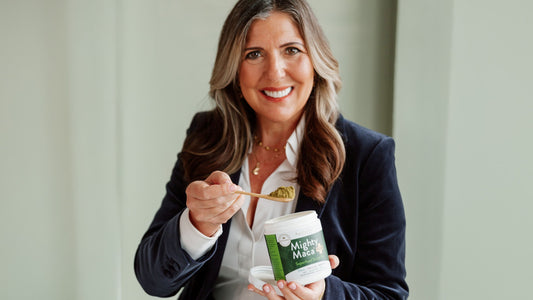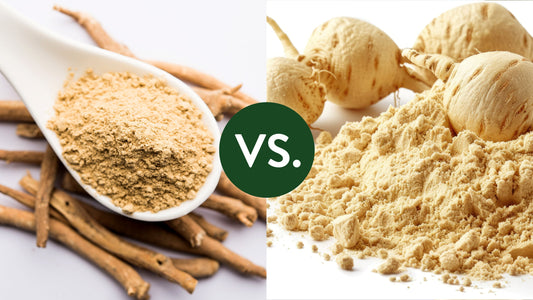Have you been feeling more tired than usual lately? Do you ever just have to take a nap — like it’s non-negotiable? Do you wake up feeling tired and struggle with fatigue all day? Or does the low energy come on like a freight train in the afternoon? If this sounds like your life, it’s possible you’re suffering from menopause fatigue.
Menopause fatigue is one of those symptoms of menopause that doesn’t get as much attention as some of the other, louder symptoms, like hot flashes. But menopause can and does make you feel tired.
Tiredness from menopause isn’t something you just have to live with though. In this article, I’ll walk you through how to polish up your sleep hygiene, diet, and adrenal health so you can finally get your energy back.
Can Menopause Cause Extreme Fatigue?
Can menopause cause extreme fatigue? Definitely. In fact, one study showed nearly half of perimenopausal and a whopping 85% of post-menopausal women reported both physical and mental exhaustion. (1)
Bottom line: you’ve never fully appreciated how much your hormones support your metabolism and energy levels until they start to become less plentiful in your body because of perimenopause and menopause.
Menopause And Fatigue Symptoms
So, what exactly does menopause fatigue look and feel like?
Many of my patients report that they just don’t feel like themselves. You may feel tired all the time, even when you first wake up in the morning. You might have trouble staying awake and feel an urgent need for a nap — when you’ve never napped in your life! Fatigue might swoop in at the stroke of 3 PM like clockwork every day.
You might have trouble concentrating. Sometimes women describe this as brain fog, or not feeling as mentally sharp as they used to.
Physical exercise can feel more demanding too. Your workouts may suddenly seem more taxing and even normal physical activity like a long day of shopping can wear you out when you used to be able to run errands all day long on a Saturday.
Why Does Menopause Cause Fatigue?
But why exactly does fatigue crop up like an unwelcome house guest during menopause?
Well, it’s not just your dropping levels of estrogen and progesterone that cause you to feel tired from menopause. There are several interconnected reasons you feel fatigue in menopause. From hot flashes that disrupt your sleep to mid-life stress, compromised adrenal health, poor nutrition, and an increased chance of developing depression — it turns out, menopause is the perfect storm for making you feel tired all the time.
Hot Flashes And Fatigue
Let’s talk about fatigue and hot flashes. A hot flash, or hot flush, is when you suddenly feel your temperature rise dramatically. And this can happen during the night, too. Maybe you’ve woken up soaking wet, drenched in sweat from head to toe. That’s a nighttime hot flash, otherwise referred to as night sweats.
It probably comes as no surprise that when you experience this, it means your sleep quality isn’t what it could be — and as a result, you feel tired the next day.
If hot flashes are your struggle, be sure to check out my Mighty Maca® Plus and its 1500+ 5-star reviews. It’s a lifesaver when it comes to hot flashes and that “I just don’t have the energy” feeling.
How Midlife And Gender Roles Cause Fatigue
Remember when you were 20 and your biggest stress in life was finding the perfect outfit for a date night?
Well, your menopause years aren’t exactly like that, are they?
These days you have to worry about aging parents, inflation, major house repairs, and wishing you had saved more for your retirement and your child’s college education expenses. A lot of us experience divorce and have to navigate custody agreements and split holiday schedules.
All of this stress on top of a lifetime of being a caregiver, provider, and homemaker…it’s enough to make anyone feel tired just thinking about it.
You might not be able to “do” a whole lot about this, but identifying the pattern and having your experience validated can help you cope. And it can also help you say “no” to things that don’t serve you anymore.
Burnout, Adrenal Health, And Menopause Tiredness
Speaking of stress, when it compounds as it does in midlife, it can seriously affect your adrenal health and contribute to those feelings of exhaustion in menopause.
When your adrenals are compromised, it takes a heavy toll on your menopausal experience.
Instead of helping your body by churning out extra DHEA which in turn becomes a very helpful backup source of sex hormones, your adrenals are now dedicated to the task of pumping out cortisol. Which isn’t helpful at all — unless you’re in a really dangerous situation.
When this happens, you can feel a near-constant low level of fatigue and yet, at night you get a second wind and be unable to sleep well. Obviously, this affects your tiredness the next day, since you still have to get up and go to work in the morning.
Lack Of Energy In Menopause And Your Diet
Another place we often see a connection between fatigue and menopause is with nutrient depletion. You don’t have to be clinically deficient in a nutrient to experience crushing feelings of exhaustion when your levels are suboptimal.
How does this happen? Well, a lot of women in perimenopause and menopause experience weight gain.
And sometimes, due to a lifetime of conditioning around weight loss and dieting…you try to simply eat less food. Which might work for a minute, but then you wind up feeling depleted, tired, and frustrated because you aren’t actually losing weight this way.
Instead of starving yourself and your body of important nutrients, focus on eating plenty of healthy fats and ample vegetables filled with vitamins so your body has the building blocks it needs to make more hormones and give you the energy to get through your day.
Menopause Fatigue, Exhaustion And Depression
It’s important to mention here that women in menopause and perimenopause can develop depression, even if they’ve never been prone to bouts of it in the past. (2)
One of the major indicators of depression is also fatigue.
So if you’re experiencing fatigue or feelings of extreme tiredness, it’s important to work with your doctor to determine if depression may also be part of your struggle.
How Can I Overcome Menopause Tiredness?
The good news is that while menopause can cause extreme fatigue, you have so much power to change your story and get your energy levels back up to where you want them to be.
Let’s take a look at how sleep hygiene, adrenal health, and diet can make a huge impact on your fatigue.
Practice Good Sleep Hygiene For Menopause Exhaustion
First things first — if you’re tired, you’ve got to prioritize good sleep hygiene.
What does that look like?
- No screens before bed
- Wearing blue-light-blocking glasses when you look at screens, especially at night
- Going to bed and waking up at the same time every day — even on the weekends
- Getting plenty of exercise, the earlier in the day, the better (exercising too late can keep you awake)
- Sleeping in a completely dark room (use light-blocking curtains, put tape over your electronics, and no nightlights)
- Keeping your bedroom at a comfortable and cool temperature
- No alcohol, caffeine, or large meals late in the day
- Create a calming self-care routine for bedtime. This can look like journaling or meditating before you go to bed.
I know it can be challenging to make new habits when it comes to sleep.
But if you can pull this off, you may just find that your menopause fatigue struggles lessen considerably.
Prioritize Your Adrenal Health To Combat Perimenopause Fatigue
Your adrenal health is the foundation of your hormonal health. Especially in perimenopause and menopause. And most especially when you are feeling tired, worn out, and exhausted.
Supporting quality sleep and focusing on your sleep hygiene as I outlined above can go a long way toward helping your adrenals.
Other things you can do to make sure your adrenals get all the love they need:
- Keep your stress in check. You can’t unsubscribe from all stress, but you can prioritize love, joy, and connection in your life. This helps combat stress in a big way.
- Check out adaptogens. These are herbs that help your adrenal glands ‘adapt’ to stress. Peruvian maca root is my favorite.
- Make sure you’re getting enough vitamin C. Your adrenals need it to thrive.
When you take care of your adrenals, they can help your menopause journey significantly. Your adrenals, when supported the right way, can assist your body in producing sex hormones (progesterone, estrogen, testosterone) as a backup when your ovaries are tapping out. This makes the menopausal transition so much gentler and it’s one of the reasons Mighty Maca® Plus is such a powerful menopausal ally.
How To Fight Menopause Fatigue With Your Diet
We talked earlier about how depriving your body of critical nutrients can lead to a lack of energy in menopause. But another thing to consider when it comes to fatigue and menopause is your blood sugar. As you age, your insulin sensitivity declines alongside estrogen.
This means now is the perfect time to cut out those simple carbs and focus on eating whole foods.
Researchers speculate that one of the reasons perimenopausal and post-menopausal women experience negative changes in their body’s blood sugar response is due to changes in the gut microbiome. (3)
One of the best ways to support your gut microbiome — including the estrobolome, a special population inside your gut microbiome that manages estrogen — is to ensure your diet includes a variety of different plant fibers. An easy shortcut here is my Mighty Maca® Plus drink. It’s packed with dozens of different superfoods to support your gut, your adrenals, and your blood sugar.
Is It Normal To Feel Tired During Menopause?
Many women experience extreme fatigue during perimenopause and menopause. Does that mean it’s normal? It definitely means it’s common.
But it also doesn’t have to be YOUR new normal.
While menopause and lack of energy may seem to go hand in hand, this is not your inevitable, written-in-stone fate.
Try working on your sleep hygiene, your adrenal health, and your diet — and watch how your energy levels explode. Be sure and let me know how it goes!



